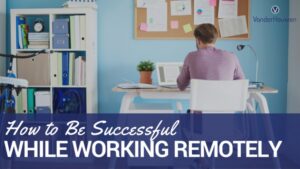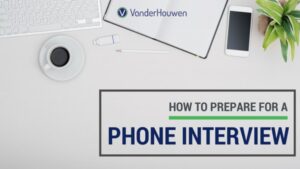How to Prepare for a Phone Interview
Originally published April 12, 2017 and revised March 16, 2020.
After countless job application submissions, receiving a follow-up email from a potential employer is perhaps one of the most anticipated and exciting moments of a job seeker’s journey. (Aside from getting an offer, of course!) In the rapidly changing world of work and social distancing, this follow-up usually results in a request for a phone interview.
For many, phone interviews can be more nerve-wracking than an in-person interview—it’s harder to interpret body language, there’s an opportunity for uncomfortable pauses and bad connections, and, most importantly, it can be difficult to prepare for. How does a phone interview differ from an in-person interview? How should you spend your time preparing?
We’re here to help! Here’s our best advice on how to prepare for a phone interview.
Phone Interviews vs. In-Person interviews
In most cases, a phone interview will be conducted by a Recruiter or Hiring Manager, and its purpose is to get a high-level understanding of a candidate. Expect basic questions about your work experience, a few behavioral questions, and some logistical clarifications about the position. If an online interview is replacing an in-person one, be thorough in explaining your background. Many employers are also opting for video chats so you can still connect despite a lack of physical proximity. During in-person interviews, not only will you go into deeper context about your work history, but you’ll likely meet other managers or members of your team, and might be asked situational questions. For example, here are a couple of examples of questions a Developer could be asked in a phone interview:- Tell me about your Linux experience.
- Have you done any Python scripting?
- Have you worked with JavaScript MVC Frameworks?
Phone Interviews vs. Video Interviews
Note that there are two different types of video interviews—live video interviews over platforms like Skype, and pre-recorded video interviews. During pre-recorded interviews, you’ll be presented with a question and given a period of time to respond. This is very similar to a phone interview, in that it’s a tool used by hiring managers for first-round screening of candidates (again, or during times when in-person interviews aren't possible). While they’re a little more challenging than a phone interview (you don’t get the benefit of having a conversation with your interviewer), you should prepare for them in similar ways as you would for a phone interview. A live video interview, on the other hand, should be treated like an in-person interview. Expect to meet multiple people, answer in-depth situational questions, and do thorough research beforehand. Be sure to dress the part and look presentable!Do Your Research
Before your phone interview, research the company to find out about its history, mission and values, organizational structure, and any current events or projects that seem interesting. Familiarize yourself with the industry that the company is in, any emerging trends in that industry, as well as key competitors and stakeholders. For example, if the company sells a software product, do a little bit of research on what their product does. Check out tutorials on their products or services, if they exist. In this process, you may become aware that there are particular technologies or skills you may need to brush up on. In fact, hiring managers will often ask direct questions that check to see if a candidate has done their research. A few examples of those questions:- Have you gone to our website?
- What do you know about our company?
- What projects, services, technologies, or products are you interested in here?
The Location of Your Phone Interview
Before the phone interview, it’s important to get a good night’s sleep beforehand, have a balanced meal, and set your mind at ease. Conduct the interview in a quiet location with minimal distractions, whether it’s at your home or in a car—but keep it indoors. Parks or your backyard aren’t the ideal setting for a phone interview because there’s a lot of potential for sound interference. Make sure your pets, roommates, or family members won’t be interrupting you. Additionally, keep your electronics charged and well connected. Don’t sit in a room with poor reception or without an outlet. Finally, if sitting makes you uncomfortable or anxious, it’s okay to stand or walk around! Do whatever makes you the most comfortable and least distracted.5 Questions You Might Be Asked
1. Tell me about a time when you worked with a difficult personality. How did you handle that situation? This is a behavioral question, so don’t focus as much on the situation itself as much as on the process of how you identified, approached, and solved a problem. Be sure to pick a situation with a positive result! 2. What do you think is your greatest weakness? Be honest when answering this question, but be sure to pick a weakness that isn’t key to the position you are interviewing for. The purpose of this question is to determine how you approach self-improvement, so focus less on the weakness itself and more on how you’re working through it. 3. What is your greatest strength? When assessing your strengths, think about the position and what the company values. Developers may focus on a technical expertise; project managers should talk more about their organizational or people skills. 4. What did you like least about your last job? Be careful with this one—never speak negatively about your former employers. Instead, frame the question in terms of your professional growth and development. Perhaps the career trajectory you were hoping for wasn’t available at your old company, or there’s a particular skill or field you want to explore that wasn’t available to you. Express your answer in a way that highlights how the company you are currently interviewing for is a perfect fit. 5. Where do you see yourself in 5 years? This is also tricky. Not only does your future employer want to confirm that you set goals for yourself and plan out the means to achieve them, they also want to know that you plan to achieve these goals at their company. For example, if the company is looking for a Senior Developer that will eventually become their team lead, you don’t want to tell them you are going to retire or want to start your own business. Focus instead on how you are interested in moving up to a level that aligns with that company’s expectations.Be Sure to Follow Up
At the end of the phone interview, thank your interviewers for their time, and let them know you’re interested in next steps. The next day, contact your interviewers via email to send a thank you note and reiterate your interest.Looking for more next steps? Reach out to a VanderHouwen Recruiter.































































































































